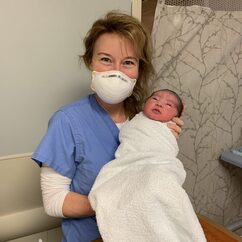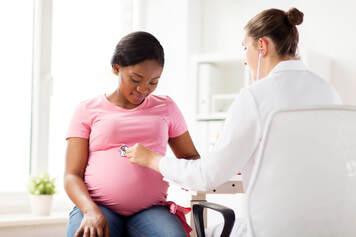 Women’s specialist: when and how often should you have a mammogram Women’s specialist offers mammograms, which is an x-ray that is used to identify any signs of breast cancer. Different views of the breast are taken so that your doctor will have a more complete picture of the breast tissue during a mammogram. Screening and diagnoses are the two ways that mammograms are used. To detect signs of breast cancer in a woman who is not showing any symptoms, a screening mammogram is performed as a preventative measure. Extra imaging of breast tissue to help the doctor see a more complete view of the breast takes place during a diagnostic mammogram. It can be nerve-wracking leading up to a mammogram examination no matter whether you have received a mammogram before or if it’s your first time. Mammograms can help spot breast cancer in its early stages and are typically painless. Guidelines for mammograms Ranging from your age to your family history of breast cancer or other types of cancer, there are many different variables that should be considered when it comes to having a mammogram. Women with average risk aged 40 – 49 Women within this age group should begin having annual breast screenings as of 2015 and recommended by the American Cancer Society (ACS). Women specifically between the ages of 45 – 49 should have a mammogram every year. The most common recommendation is to have your first mammogram in your 40’s. However, you should consider your health and your family’s health history and speak to your doctor to decide when and how often you should go for a screening. Women with average risk aged 50 – 74 Annual mammography screenings are recommended, women between the ages of 50 – 54 should have one annually. But those who are aged 55 and older are recommended to switch it to 2 screenings a year. Women with average risk aged 75 and older There are a few things for women in this age group to consider, such as:
Women’s specialist in Atlanta and Alpharetta GA The women’s specialist in Atlanta and Alpharetta GA says your need for a mammogram will vary when compared to other women, this is depending on your health risk factors, age, and family history. When you are looking into having a mammogram screening, it is essential to consider these factors. Contact your top Alpharetta and Atlanta OBGYN for your obstetrics and gynecology care.
0 Comments
Women’s health experts in Atlanta and Alpharetta GA offers advice to manage high-risk pregnancy6/29/2021  Women’s health experts and high-risk pregnancy management When women’s health experts tell you that your pregnancy is at high risk can feel concerning whether it is your first pregnancy or your third. It is a term that can describe a wide array of common conditions. Many of them are conditions you might have developed during delivery or while pregnant, they can also be related to any pre-existing conditions you may have had before you became pregnant. Your pregnancy will not necessarily be more challenging or difficult than a low-risk pregnancy. However, it does sometimes mean that you will undergo more monitoring and consult a maternal-fetal medicine specialist compared to someone with a low-risk pregnancy. What does it mean to have a high-risk pregnancy? You will need extra care to have a healthy pregnancy because of your particular health situation when you have a high-risk pregnancy. Health conditions and circumstances such as HIV, gestational diabetes, and preeclampsia are all applied to the term high-risk. What are the symptoms of a high-risk pregnancy? It is often difficult to distinguish the symptoms of a typical pregnancy from symptoms of a high-risk pregnancy. However, the symptoms will be far more severe and may last longer than a normal pregnancy. During a pregnancy that is high-risk a woman may experience:
What steps can be taken to have a healthy pregnancy? Always stick to the basics, whether you simply want to do whatever you can to prevent a high-risk pregnancy or you already know ahead of time that you will have a high-risk pregnancy.
Additional tests may be recommended to further assess the development and health of the baby, in addition to regular screening exams. These may include a targeted ultrasound, which can provide doctors with detailed information compared to standard testing. Women’s health in Atlanta and Alpharetta GA You may be referred to a specialist in genetics or maternal-fetal medicine in addition to your visits with your regular obstetrician. Contact your top Alpharetta and Atlanta OBGYN for your obstetrics and gynecology care.  Women's health: a guide to a natural childbirth Women's health experts at your local OBGYN in Atlanta and Alpharetta can help if you have made the decision to have a natural childbirth. If this is your goal, education and preparation can help you have a natural childbirth without any unnecessary intervention. However, you should always keep in mind that it may not always be possible. Medical intervention may be necessary to protect your baby and you this is because labor and delivery are unpredictable. It is still worth knowing all of your options beforehand so that you can be comfortable with your decision if natural childbirth is something that you want to try. What is natural childbirth? All types of childbirth can be considered natural and there is no right way to bring a baby into the world. Natural childbirth can involve a variety of choices but has historically been referred to as vaginal labor and delivery with no or limited amounts of medication. The whole experience of giving birth is a very personal one and it's up to you to determine your situation and what natural childbirth means to you. Natural childbirth might be chosen because it can help you feel more in control of the process, or because you want to feel a deeper connection to the experience. If you have a low-risk pregnancy, natural childbirth may be an option for you. Your doctor will help you to decide if it is a safe option for your baby and you. What are some of the benefits of natural childbirth? Women who choose an unmedicated birth are able to do so because they know what their bodies are capable of without medicine. Other benefits include the ability to move as a method to cope with the pain, because you can move easier pushing will be more effective, and you will be able to walk sooner after you give birth to your baby. Where is a natural birth done? You may choose to deliver in a setting where natural childbirth is the main focus such as a birth center. You will have the ability to get in a position that is more comfortable for you, move around during labor, and even spend time in a tub or jacuzzi. You can even use a handheld ultrasound device to monitor the baby. Relaxation techniques, visualization, cold and warm compresses, massage, and hydrotherapy are often used as comfort measures. You will also be able to drink and eat whenever you choose. Having a more natural childbirth is possible in many hospitals these days. A natural approach can be taken in the hospitals' birth centers, but, if needed, any medical intervention is also nearby. A homelike setting where you can deliver and recover without needing to move can happen in these hospitals that have modified their birthing center. Women's health in Atlanta and Alpharetta GA – OBGYN Natural childbirth plan The women's health experts in Atlanta and Alpharetta GA recommend that you think through what you want and why, discuss it with your birthing team, and outline your plan. Contact your top Alpharetta and Atlanta OBGYN for your obstetrics and gynecology care.  Top OBGYN: What are bioidentical hormones? Top OBGYN in your local Atlanta and Alpharetta GA practice explains that hormones serve as an internal communication system between cells and control most of your body's basic functions. Appetite, digestion, mood, libido, and immune functions are coordinated by your hormones. It can have a big impact on your well-being and health when your hormones are even slightly out of balance. Bioidentical hormone replacement is a form of therapy that can ease symptoms and is used when someone's hormone levels become unbalanced or drop. It is used as a natural solution to hormone issues. Why are bioidentical hormones used? Key hormone levels in the body go down as women age. Including progesterone and estrogen, which can lead to certain problems. This is more common with women who are experiencing perimenopause or menopause. The treatment involves replacing the hormones that have been lost with therapy. Symptoms will improve and hormone levels will increase as a result. Your OBGYN can help discuss the variety of options that are available to you based on your preferences. Benefits of bioidentical hormones Hormone replacement may also reduce your risk for diabetes, cataracts, and tooth loss, in addition to helping with symptoms. It has also been shown that it can help improve hydration, skin thickness, elasticity, and reduce wrinkles. Bioidentical hormone therapy has been known to be effective in improving the general well-being and quality of life of those with cancer and their treatments have affected their estrogen levels. What are the risks? Hormones can have risks to women who are taking them. The risk of stroke, blood clots, and gallbladder disease are increased. The risk of breast cancer and heart disease may also increase in older women that use hormone therapy for a longer period of time. Bioidentical hormones are considered by doctors to be safer than regular hormone therapy, however, it has not been shown that the risks are lower. How can bioidentical hormones be taken? Bioidentical hormones are available variety of forms including creams, injections, gels, patches, and implanted pellets. If you are considering using hormones you should consult with your doctor and discuss what is best for you. Regular monitoring will likely be needed once you start your treatments to see how your body responds. Top OBGYN in Atlanta and Alpharetta GA thoughts on how to get started The top OBGYN in Atlanta and Alpharetta GA knows that bioidentical hormone therapy is an option for women who are experiencing symptoms of low or unbalanced hormone levels. However, as we discussed, there are risks associated and you need to talk with your doctor. If you do decide to begin treatments you should start with the lowest dose that shows any effect for the shortest amount of time. Contact your top Alpharetta and Atlanta OBGYN for your obstetrics and gynecology care.  Women’s health experts: what is endometriosis? Women’s health experts describe endometriosis as an often painful diagnosis, it is a growth inside of the uterus that consists of tissue that is similar to the tissue that already lines the inside of the uterus. It is very rare for endometrial tissue to spread outside of the pelvic organs and most commonly involves the ovaries, fallopian tubes, and the tissue lining the pelvis. Endometriosis is a common condition that affects approximately two to ten percent of women of childbearing age. The pelvic region of a woman’s body can become inflamed and painful during the hormonal changes of the menstrual cycle and affect the misplaced tissue. The tissue will then grow, get thicker, and break down and over time the broken-down tissue has nowhere to go and stays trapped in the pelvis. The trapped tissue can cause irritation, formation of scars, severe period pain, and fertility problems. Endometriosis symptoms The most common indication of endometriosis is a pain in the pelvis. Other symptoms will vary, some may experience mild symptoms whereas other women will have moderate or severe symptoms. While pain is a symptom of endometriosis, the level of pain that is experienced isn’t an indication of the degree of severity. You can have a large amount of pain with only a mild form of the condition, or you can have a more severe form of it and only experience some mild discomfort. Other symptoms of endometriosis can include painful, periods, lower abdomen pain before and during menstruation, infertility, and more. It is very important that you have regular exams with your gynecologist, you may show no symptoms at all and still have the disease, a regular visit will give the doctor a chance to monitor any changes. This is very important if you have multiple symptoms. Treatment for endometriosis Endometriosis can be treated with either medications or surgery, in some cases, both may be needed. If left untreated, this condition can be a disruption to your life. There is no cure for endometriosis but the symptoms can be managed. Your women’s health doctor will first try more conservative forms of treatment, if conditions don’t improve surgery may then be recommended. Results of these treatments will vary from person to person but your doctor will help you along the way to determine which form of treatment will be best for you. Other treatments, such as hormonal medications, will not be suitable for women who are looking to conceive, so it is important to discuss the goals of treatment if you are looking to improve your fertility, your doctor will let you know the best course of action. Women’s health experts in Atlanta and Alpharetta will help you treat endometriosis Many women believe that pain during a period is normal and doesn’t require any attention. It is important for any potential issues to be addressed early, so speaking with your Georgia Obstetrics and Gynecological experts when your experiencing pain that is higher than normal. Contact your top Alpharetta and Atlanta OBGYN for your obstetrics and gynecology care.  Top gynecologist answers: why is prenatal care important? Your top gynecologist will tell you that pregnancy will bring around a lot of changes to a woman’s body because of the increase in hormones and the growing baby. Extra care should be taken by the woman to be sure that they have a healthy pregnancy. Regular visits to a gynecologist are a very important part of prenatal care that will benefit both you and your baby. A top gynecologist in Atlanta and Alpharetta GA will be able to help identify and treat any problems as fast as possible if they do arise. Visits to your doctor will also give you an opportunity to ask any questions that you have during your pregnancy. Prenatal care will help you feel more comfortable and confident when the time comes for you to go into labor. What is prenatal care? Prenatal care is the healthcare that you will get while you are pregnant. It helps to catch any potential problems and reduces the chance of pregnancy or birth complications when you have regular prenatal care. If you don’t have an OB/Gyn already, you can call your health insurance provider to help find which doctors are covered by them. Afterward, you should get in touch with them as soon as possible. Throughout your pregnancy, you should prepare to see your doctor regularly. You can expect to have your first appointment when you are around eight weeks pregnant. These visits will give your doctor an opportunity to give you advice such as a proper diet, exercise, and proper weight gain that will keep both you and the baby healthy. What about postpartum care? Most of the time pregnancy care will focus on prenatal care. However, a focus on postpartum care is a necessary part of pregnancy. This period exists until around six to eight weeks after the baby is born. This is a period for the mother to learn how to take care of the baby and can experience emotional and physical change. Proper nutrition, rest, and vaginal care are needed during this period. Why is prenatal care important? To ensure a healthy pregnancy, pregnant women need to take very good care of themselves. Regular and early prenatal care is the foundation of a good pregnancy and delivery. Expecting mothers who are regularly maintaining good prenatal care give birth to babies with a lower chance of low birth weight or even death. Good and bad nutrients can both be passed along to the baby so a healthy diet is important. Harm, such as birth defects, and developmental disabilities, can be caused by things such as drugs, nicotine, and alcohol. Prescription medications should also be taken with care under the recommendations of your doctor. Women must make use of all the prenatal care that is available to them. Top gynecologist in Atlanta and Alpharetta GA recommends these next steps No matter what stage of the pregnancy, you should stay educated about what is going on with your body and the growth of the baby. This is crucial to keep you and the baby healthy and safe in order to be ready for pregnancy. Showing up to all of your Georgia Obstetrics and Gynecological appointments and be ready to ask any questions you have for your doctor. Don’t be afraid to write these questions down if you’re afraid that you are going to forget. Contact your top Alpharetta and Atlanta OBGYN for your obstetrics and gynecology care.  Women specialists in Atlanta confirm that there are several methods to help women with fertility issues and SIS is one of them. SIS known as Saline Infusion Sonohysterography is used to evaluate the uterus and the uterine (endometrial) cavity. This is a procedure in which a physician injects sterile saline into the uterine cavity with ultrasound guidance. This allows your OBGYN to identify any abnormalities of your uterus, including:
What is the process of SIS? Women specialists say that SISs are performed between days five and 10 of the menstrual cycle. A speculum is inserted into the vagina and the cervix is cleaned with a Betadine solution. A small catheter is passed through the cervix, and sterile saline is gently injected while vaginal ultrasound is performed. The entire procedure of SIS takes about 15 minutes. No anesthesia is required, and any pain after the procedure is minimal. SIS: procedure, risks, and results Georgia women specialists, at Georgia OBGYN, advise that you call the office the first business day after your period begins to schedule the procedure. And if there is any doubt about the normalcy of your period so a pregnancy test can be performed, please notify our office staff. It is crucial to be certain you are not pregnant before doing an SIS. Because the patient may experience mild cramping with this procedure, she may want to take either 600 mg of Ibuprofen (Advil, Motrin) or 1000 mg of Acetaminophen (Tylenol) 45 minutes before the procedure. And take the prescribed antibiotic twice on the day of the procedure. A patient may experience some mild cramping, discharge, or spotting during or after the procedure. These symptoms usually disappear very quickly after the procedure. Less than 1 percent of all patients undergoing SIS may develop an infection as a result of the procedure. Should you develop a usual pain or a fever after the procedure, please notify your physician. Women specialists say that an SIS is routinely done before in vitro fertilization, before the embryo transfer. Your gynecologist may also perform this test if you have abnormal bleeding, a history of recurrent miscarriages, or a history of uterine surgery. Your physician will be able to review the results with you immediately after the procedure. The next steps will be based on the findings. Top Atlanta and Alpharetta's OBGYNs We are fully focused on providing the best health care and treatment for women of all ages, we have a full complement of medical specialists ready to help you. Book a consultation with your top Alpharetta and Atlanta OBGYN for your obstetrics and gynecology care. We are your best specialists in terms of women's well-being.  Women’s clinic says that a miscarriage is a tragic loss that can cause a mother to experience tremendous grief and sadness. During such times, it's important to know you're not alone. Miscarriages are rarely talked about, but they occur more often than you might expect. Many women are surprised to learn that at least 15-20% of all pregnancies end in miscarriage. Suffering a miscarriage can be a devastating and confusing time for a woman. Learning more about miscarriages can help many prepare for what's to come and perhaps give them a measure of comfort in knowing that most women who miscarry go on to have successful and happy pregnancies. Risk factors and causes of miscarriage Women’s clinic physicians explain that miscarriages can occur any time before the 20th week of pregnancy, though most occur before the end of the first trimester. Once a heartbeat is detected (usually around the 12th week of pregnancy), the chance of a miscarriage significantly decreases. Women have a greater risk of miscarrying as they age. Miscarriages caused by chromosomal anomalies do not indicate a future risk of miscarriage. Besides the age of the mother and chromosomal anomalies, other risk factors for miscarriage. Again, most women who miscarry proceed to have healthy, successful pregnancies. What to expect during & after a pregnancy loss? Women clinic specialists explain that the height of a miscarriage involves heavy bleeding for several hours. It may begin with light spotting and cramping, or heavy bleeding may begin suddenly. You will pass large clots of blood and may have mild to heavy cramping. You may want to begin taking an over-the-counter painkiller or one that your doctor has prescribed early in the miscarriage to prevent cramping from escalating. Most miscarriages can happen at home, though you should stay in contact with your OB/GYN or midwife. You can usually start having sex about four weeks after a miscarriage and your period will likely come back after six weeks. Though it's possible to get pregnant immediately following a miscarriage, your healthcare provider may recommend you wait for a full menstrual cycle before you try to get pregnant again to allow time for physical healing. Top Atlanta and Alpharetta GA OBGYNs Did you or someone you love recently have a miscarriage? Find a pregnancy loss support near you to connect with doctors and women who understand what you're going through. Georgia OBGYN is your best local women's health specialist. We are fully focused on providing the best health care and treatment for women of all ages, we have a full complement of medical specialists ready to help you. Book a consultation with your top Alpharetta and Atlanta OBGYN for your obstetrics and gynecology care.  Obstetricians are women's health specialists in Atlanta and Alpharetta Georgia. They can effectively handle hormone therapy for patients. Hormone therapy was once routinely used to treat menopausal symptoms and protect long-term health. What does this mean for you? Hormone therapy is a medication that contains female hormones. Patients take the medication to replace the estrogen that their body stops making during menopause. Hormone therapy is most often used to treat common menopausal symptoms, including hot flashes and vaginal discomfort. Hormone therapy has also been proved to prevent bone loss and reduce fracture in postmenopausal women. However, there are risks associated with this therapy. These risks depend on the type of hormone therapy, the dose, how long the medication is taken, and the individual health risks. For best results, hormone therapy should be tailored to each patient' and reevaluated often to be sure the benefits still outweigh the risks. What are the basic types of hormone therapy? Obstetricians say hormone replacement therapy primarily focuses on replacing the estrogen that the body no longer produces after menopause. There are two main types of estrogen therapy:
What are the risks of hormone therapy? The risk associated with hormone replacement therapy include:
Though studies have suggested that these risks vary depending on the patient:
All of these risks will be considered by the physician when deciding whether hormone therapy might be an option for you. Best obstetricians in Alpharetta and Atlanta Georgia Obstetricians say to determine if hormone therapy is a good treatment option for you, talk to your OBGYN about your symptoms and health risks. Be sure to keep the conversation going throughout your menopausal years. As researchers learn more about hormone therapy and other menopausal treatments, recommendations may change. If patients continue to have bothersome menopausal symptoms, it is advisable to review treatment options with your physician regularly. Georgia OBGYN is your best local physician for hormone therapy. They can help patients decide on the best plan that best fits their health. Book a consultation with your top Alpharetta and Atlanta OBGYN for your obstetrics and gynecology care. |
AuthorThe best women’s specialists in Atlanta and Alpharetta. Archives
November 2021
Categories
All
|
 RSS Feed
RSS Feed
